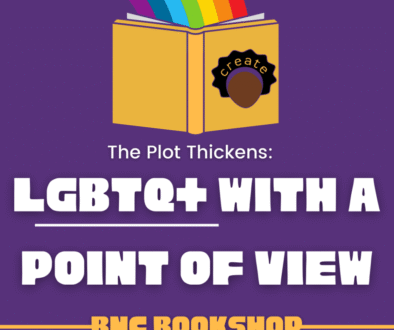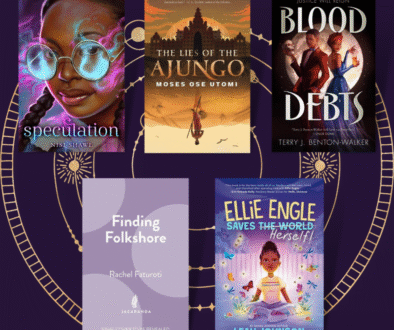The Plot Thickens: Take My Hand
Content warning: racism, sterilization of minors, ableism, depression, abortion
Never has the past felt so close as it does with Dolen Perkins-Valdez’s latest release Take My Hand. Set concurrently in 2016 and 1973, Take My Hand takes inspiration from a legal case that took place in 1973, Relf v. Weinberger. By creating a main character that has a hand in the medical malpractice covered within this case, forced sterilization of poor women and adolescent girls within the same year that the Tuskegee case gained notoriety, the reader holds a vantage point on the injustice felt within this time period while also understanding the contemplation behind several aspects of the Black community.
As an avid reader who meanders through a higher than average amount of books every year, I’ve found that I’m able to best ground myself in books—even when I work through them in quick succession—when they’re aligned with supplemental media. This holds true with my experience reading Take My Hand which is told from the perspective of an upper middle class Black woman, Civil Townsend. Her parents are a doctor and artist, and she lands her first job as a nurse servicing poor Black families in rural Alabama right after gaining her certifications and degree. Through this job Civil is introduced to the lack of care provided to the Williams sisters— Erica, 13 and India, 11—who have both been receiving birth control shots from the government-funded Montgomery Family Planning Clinic where she feels great pride working at. This pride begins to shrink as she realizes that neither sister is sexually active and that India is not even eligible for birth control. The shock of learning this parallels Civil’s astonishment at the conditions the Williams family lives under—namely living on a white man’s property whom the father provides labor for in exchange for the one-room shack that the father, two sisters, and their grandmother are forced to share. Coincidentally, my YouTube algorithm recently recommended a video wherein a Black reporter and genealogist travel to rural Georgia where they find a man living in similar conditions in the present-day. Having watched this video roughly three weeks prior to reading Take My Hand, I was able to grasp the level of dismay, then recognition that not only are there levels of privilege that keep us from seeing how little has changed over time (in 2022 and for Civil in 1973) but also that as time goes on we lose connection with people as we embrace ‘modernity’—often truly whiteness disguised as progress. The way Civil interacts with the Williams family after learning about their situation reminds me a lot of my experience learning about family history from a great aunt who is currently researching our family’s history. She learned that some of our family lived with a white family after emancipation in Tennessee, though she remains unsure about what the nature of the living arrangement was, as it does not seem to be a typical sharecropping arrangement. In watching the video and reading Take My Hand, I’ve come to a better understanding of what that could look like and what it means for where we are now.
With passages like:
My daddy had made sure that I was educated not only in my books but also, as he had once described it, in the code that dictated our lives in Alabama. Knowing when to keep your mouth shut. Picking your battles. Letting them think what they wanted because you weren’t going to change their minds about certain things.
Now, you know how some white folks feel about Black bodies. They think we can tolerate pain better than them. According to some of these documents I’m about to show you, some of them even thought syphilis couldn’t kill us. It was as much an experiment about the effects of the disease as it was a crazy white man’s idea of a laboratory game with Black bodies.
While I admired his demeanor, it was still difficult for me to listen to Lou declare that Mace and his mother had been outsmarted by Mrs. Seager. Yes, it was true, neither of them could read, but his portrayal of them as simple country people whose priority was day-to-day survival fell short. These people were smarter than that. Mrs. Williams could put a piece of sweet potato pie in her mouth and know exactly how much nutmeg was used. Mace could stick his finger in the soil and tell you what would and would not grow in it, could recall the name of trees I had never even known existed. They were more than illiterate farmers, more than victims who’d been duped by the federal government. They were a family who, given other opportunities, could have accomplished much more.
Take My Hand showcases the agency and wherewithal that Black people approach injustice with, a theme throughout the novel. Prejudices could easily lead Civil to remain in a mindset of privilege but her instincts and the support group around her keeps her from invalidating the experiences of others.
Civil’s growing understanding as a fresh college graduate reminds me so much of how my friends and I grew in understanding of the injustices wrought against Black people, possibly including our relatives, while also feeling that we stood on a level of professional proficiency that simultaneously holds us responsible for maintaining knowledge of the world around us and sharing it with people who may not have the same access to veritable information. As the book moves on, Civil’s attachment to the sisters goes from one of disillusionment and guilt to checked savior complex and love. Her emotional detachment from a love interest and other important people in her life makes her relationship with the Williams family that much more intense and seems unsustainable right up to the one of the most heartbreaking scenes in the book. By showing us flashes of the thoughts that continue to plague Civil in 2016 after the events of 1973 have led her down a path she resisted, we see that the guilt she carries for what happens to the Williams’ is wrapped up in her love and sense of justice. This mixture of love, guilt, and justice is pervasive in each of Civil’s important relationships—including her relationship with herself. Perkins-Valdez keeps this aspect of her character consistent throughout the story and Civil’s development as a character, which makes Civil feel like someone the reader knows. With the supporting characters similarly realized in the novel, one can’t help but feel you’ve been dropped into these families’ lives chapter after chapter.
I would be remiss if I did not warn you that this book is not for anyone seeking a light-hearted read. Take My Hand swims in the deep issues surrounding medicine, Black people, and poverty. Pick up this book:
- if the content warnings and review do not put you off;
- if you want representation of many facets of Blackness not long after the passage of multiple Civil Rights amendments in the U.S.;
- if you want a starting point for discussion with the relatives you know who lived through this period;
- if you’re used to embracing the harsh realities of what being voiceless in a country that does not care about who it oppresses looks like;
- if you have a strong sense of justice and love for community.
Take My Hand is an April 2022 release that already feels like one of my favorites of the year. I do not often feel this represented by any form of media. Somehow this wondrous novel has found a way to represent pieces of me that I did not know needed light.



